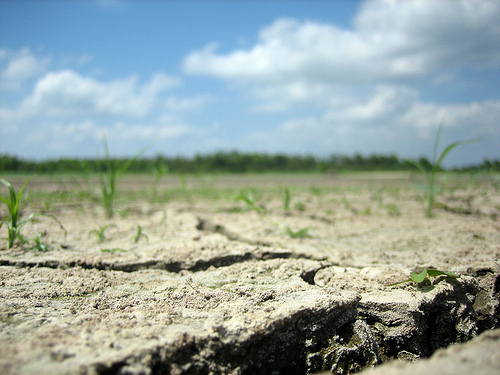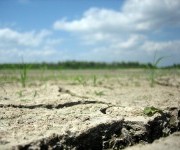 Lakeview Park, Texas.Photo: dasrooflessCross-posted from Climate Progress.
Lakeview Park, Texas.Photo: dasrooflessCross-posted from Climate Progress.
In August, agronomists showed that the historic drought in Texas had caused a stunning $5.3 billion in losses in the agricultural sector. Two months later, even with some rain finally coming to the state, Texas farmers are being crippled by a drought that could stretch beyond next summer.
As the economic losses pile up, they are having an impact on global commodities like cotton and beef — stretching this crisis well beyond the state of Texas, and showing just how “global” the problem of global warming truly is. Kate Galbraith reported on the “catastrophic drought” for The New York Times:
Some of the farthest-reaching effects may be on world cotton markets. Texas produces about 50 percent of U.S. cotton, and the United States in turn grows between 18 and 25 percent of the world’s cotton, according to Darren Hudson, director of the Cotton Economics Research Institute at Texas Tech University. This year, however, yields even from irrigated crops have fallen about 60 percent on the high plains where the bulk of Texas’s cotton crop grows, Mr. Hudson said. Farmers have given up on their “dry-land,” or unirrigated, cotton crops.
And it’s not just cotton. A terrible peanut crop will soon result in significantly higher costs for peanut butter products; pumpkin prices have also spiked due to a shortage from Texas; and beef prices are likely to rise due to the crisis:
Many Texas ranchers are selling off large parts of their herds as the grass dries out and water becomes scarce. Some are buying hay from farms a thousand miles away, despite the high cost of shipping.
The sell-off of cattle because of the Southwestern drought could push already-high beef prices higher during the coming years, according to Kevin Good, a senior market analyst at CattleFax, a company that does market analysis for the cattle industry. That is because many cattle are headed to the slaughterhouses now, reducing future supply.
Since the record-setting drought began, the Texas Agrilife Extension Service reports that the livestock industry in Texas has seen more than $2 billion in losses, and the cotton industry has seen $1.8 billion in losses. Climate change will only make such drastic economic losses worse, sending larger ripples through the global economy.
Meanwhile, Texas governor and presidential candidate Rick Perry continues to call efforts to lower climate-change inducing greenhouse gases “job killers.”
If Rick Perry has his way and prevents the U.S. from doing anything about addressing climate change, crippling droughts will become the norm and he’ll be the biggest job killer of all.



